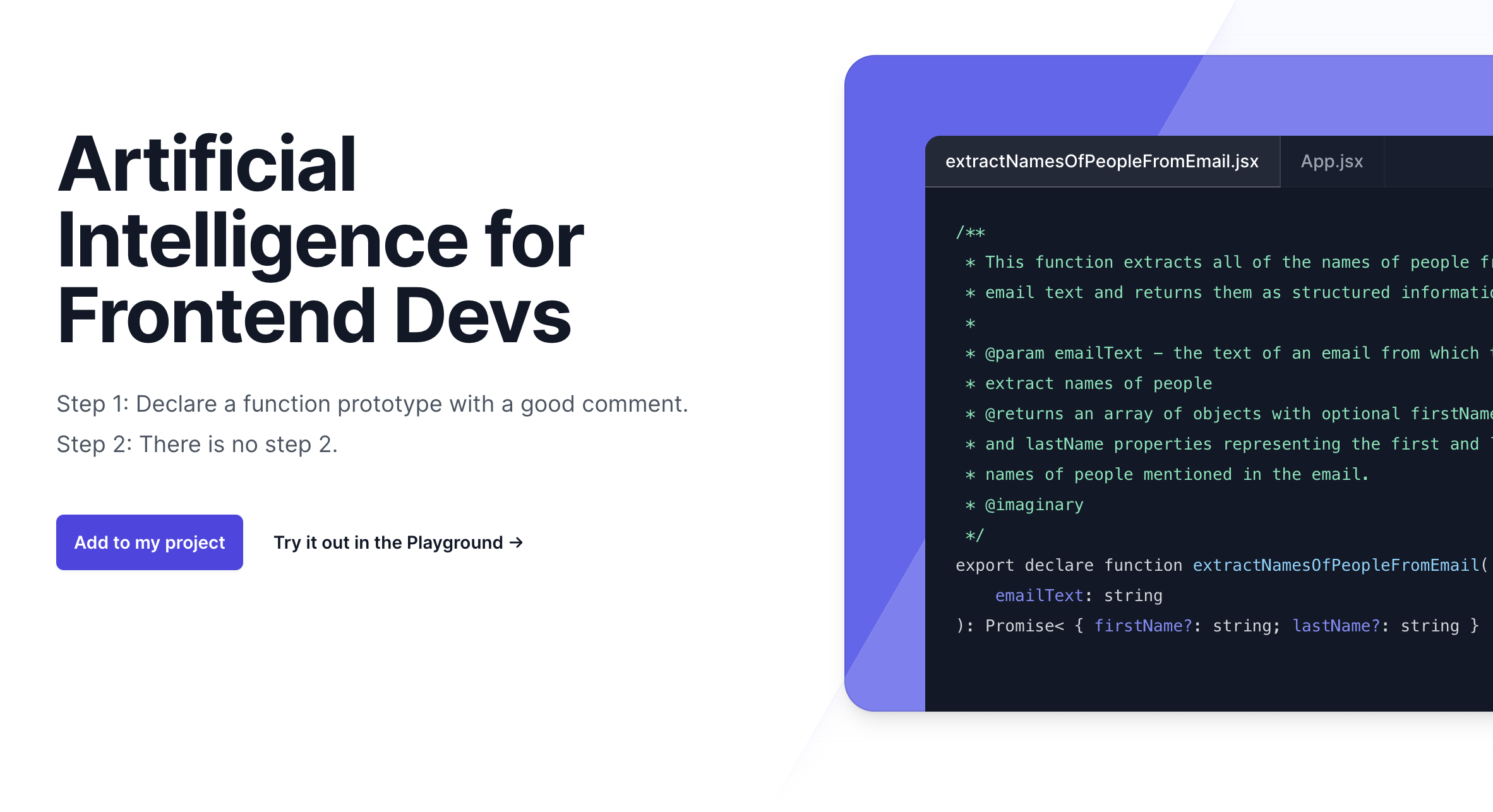
- ( 0 Reviews )
Checkout Imaginary Programming – Rewritten Product Title: “Frontend Developer’s Plagiarism Checker”
Product Description
Imaginary Programming is a TypeScript-based tool that leverages OpenAI’s GPT engine to assist frontend developers in incorporating artificial intelligence into their projects by enabling them to define a function prototype without the need for implementation, while also providing capabilities for generating human-like titles and extracting structured data from unstructured language. The platform offers an online playground for experimentation with its features.
Other Product Information
- Product Category: Productivity
- Product Pricing Model: Free
Ideal Users
- Frontend Developer
- Data Scientist
- Machine Learning Engineer
- Natural Language Processing (NLP) Specialist
- AI Researcher
Ideal Use Cases
For Frontend Developer
- Generate dynamic titles for web pages based on user input
- Create chatbots using natural language processing
- Implement AI-powered search functionality
- Add sentiment analysis to web applications
- Develop intelligent forms and surveys
- Implement AI-powered chatbots in mobile apps
For Data Scientist
- Generate a chatbot for customer service: As a Data Scientist, one should use Imaginary Programming to quickly create a chatbot that can handle customer queries and provide relevant responses using natural language processing (NLP) capabilities.
- Develop a recommendation system for e-commerce website: With Imaginary Programming, I could easily develop a recommendation system that suggests products based on user preferences and behavior.
- Create a sentiment analysis tool: Using Imaginary Programming, I can develop a tool to analyze customer feedback and determine the overall sentiment of a product or service.
- Develop an image recognition system: With Imaginary Programming, I could create an AI-powered image recognition system that can identify objects in images.
- Generate a voice assistant: Using Imaginary Programming, I could develop a voice assistant that can understand and respond to user queries.
For Machine Learning Engineer
- Generate a chatbot for customer service: Developers can use Imaginary Programming to create a chatbot that can understand and respond to customer queries, providing personalized recommendations based on their preferences and past interactions.
- Build a recommendation engine for e-commerce: Developers can use Imaginary Programming to build an AI-powered recommendation engine that suggests products to users based on their browsing history and purchase behavior.
- Develop a sentiment analysis tool: Developers can use Imaginary Programming to create a sentiment analysis tool that can classify customer feedback and reviews as positive, negative or neutral.
- Create a chatbot for social media management: Developers can use Imaginary Programming to build a chatbot that can handle customer queries and interactions on social media platforms.
- Develop a recommendation engine for news articles: Developers can use Imaginary Programming to create a recommendation engine that suggests relevant news articles based on user interests.
For Natural Language Processing (NLP) Specialist
- Automating Documentation Generation: As a Natural Language Processing (NLP) Specialist, one should use Imaginary Programming to automatically generate documentation projects by inputting function prototypes and allowing GPT to classify and extract structured data from unstructured text. This would save time and improve the accuracy of codebase.
- Chatbot Development: one should use Imaginary Programming to create chatbots with human-like intelligence that can understand user queries and provide relevant responses.
- Sentiment Analysis: one should use Imaginary Programming to analyze customer feedback and reviews to determine sentiment and improve product development based on the insights gathered.
- Text Summarization: one should use Imaginary Programming to summarize large amounts of text data for easier analysis and understanding.
- Natural Language Understanding: one should use Imaginary Programming to understand user queries and provide personalized recommendations based on their language patterns and preferences.




